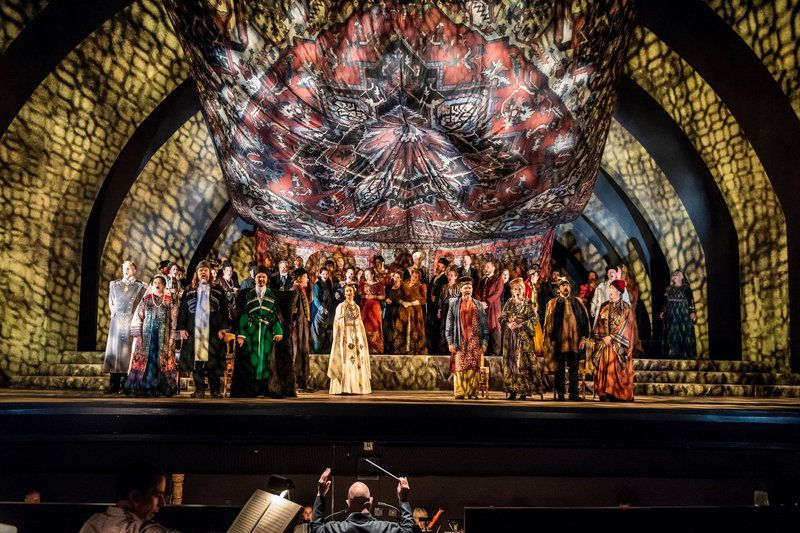
Review: Rubinstein’s ‘Demon’ Is Redeemed in a Rare Staging
By Anthony Tommasini
July 31, 2018
ANNANDALE-ON-HUDSON, N.Y. — Anton Rubinstein’s “Demon,” a nearly forgotten Russian opera from 1871, was one of the most popular works of its day. And a crucial seduction scene in Act III suggests why.
During this episode, the title character — a fallen angel — visits Tamara, the lovely daughter of a prince, in a convent where she has sought peace after her intended husband is killed. The demon, smitten, implores Tamara to love him (to save him, really). Unimaginable delights await, he says, if she will join him for eternity.
You might think this dramatic conflict calls for music charged with demonic undercurrents and exotic Russian fervor. Instead, Rubinstein’s score has a 19th-century Romantic character that owes much to Schumann and Mendelssohn. In a way, this ardent, rhapsodically lyrical and daringly long scene poignantly humanizes the demon and his beloved mortal.
It hooked me on Sunday here at the Sosnoff Theater at the 2018 Bard SummerScape festival, which is offering a rare production of an opera that has sunk into obscurity. “Demon,” colorfully directed by Thaddeus Strassberger and running through Aug. 5, is the latest rescue operation by the conductor Leon Botstein, who has made it a mission to bring attention to unjustly forgotten works. With this, he has a winner.
Rubinstein (1829-94) — a virtuoso pianist, noted conductor and the founder of the St. Petersburg Conservatory — looked to Western Europe for models of composition and music education. Still, the generation of composers that followed, which included Nicholai Rimsky-Korsakov (the focus of this summer’s Bard Music Festival), considered Rubinstein too conventional. They set out to invent, as they saw it, a truer Russian style, with exotic scales and folk tunes. But heard in the larger European context of its time, “Demon” holds up very well, especially in the surging, rich performance Mr. Botstein drew from the American Symphony Orchestra and the the Bard Festival Chorale.
The opera begins with an ominous prologue that takes place in a realm between heaven and hell. As a furious storm drenches the landscape below, the demon (the baritone Efim Zavalny) vents his disdain for the weakness of human life and its scant resistance to his power. An Angel (the mezzo-soprano Nadezhda Babintseva) tells him that human love could restore him to heaven. The demon, rejecting God as a “tyrant” who demands obedience, not power, seeks freedom and knowledge.
Based on a poem by Mikhail Lermontov, the opera may seem like a familiar tale of supernatural intervention in human life. But Rubinstein’s music explores the everyday humanity of the story. The demon, a Mephistophelian figure, emerges as a flawed, suffering Romantic hero. And Mr. Strassberger emphasizes this in a production that frames the plot as Tamara’s flashback and mingles its various settings through abstract stage imagery, with extensive use of videos.
True to this production’s sensitive reading of the opera, the soprano Olga Tolkmit presents Tamara as a young woman fraught with confusion. When the demon appears, only she can hear and see him. The man she has been pledged to is a dashing prince — but it is an arranged marriage. When the demon promises to make her princess of the universe, Ms. Tolkmit’s Tamara, teeming with sexual desire and fear of her unknown married future, cannot help being intrigued. Her voice penetrating and bright, with a slight metallic tinge that lends it intensity, she brings out Tamara’s confusions and yearnings compellingly.
Mr. Zavalny’s demon is a handsome, feral presence, stalking about in a loose, long coat. His dark hair is gleaming; his gaze, intent. He certainly looked and acted the part, and his dusky voice suits the role, even though he was sometimes strained in his upper range and had occasional pitch troubles on Sunday.
The tenor Alexander Nesterenko’s virile voice and noble bearing were ideal for the well-meaning Prince Sinodal. During a scene in which the prince and his men rest at a camp en route to the wedding, he has an erotic dream about his bride-to-be. In this bold staging, Tamara appears and actually straddles the prince, who then awakens, horrified at his own thoughts — which were implanted in his mind by the demon, who soon arranges for the prince and his men to be ambushed by infidels.
There are strands of the music that abound in what we think of today as Russian style, characteristic of Glinka and Borodin, especially during a rousing dance scene as guests gather for a wedding that never happens. The Pesvebi Georgian Dancers, an impressive Brooklyn-based ensemble of acrobatic men and twirling women, were riveting during these animated episodes. Other standouts in the cast included the earthy bass Andrei Valentii, as Tamara’s father, and the rich-voiced mezzo-soprano Ekaterina Egorova, as Tamara’s nanny.
In the end, Tamara does allow herself to be kissed by the demon. She dies, but is forgiven and ushered into heaven; the demon is again condemned to solitude.
For me, “Demon” might be compared favorably to Gounod’s “Faust,” one of the more overrated staples in the repertory. American opera companies that rely on works like “Faust” should take a chance on “Demon,” which offers a fresh, rich alternative: a Mephistophelian story with a spiritual twist. I could imagine a production with a strong cast being a hit at the Metropolitan Opera. For now, we have Mr. Botstein to thank for this inspiring rescue job.
https://www.nytimes.com/2018/07/31/arts ... ctionfront